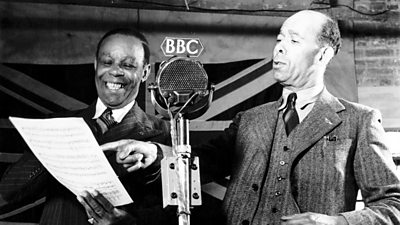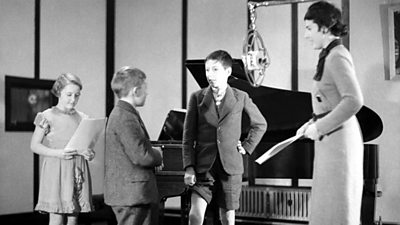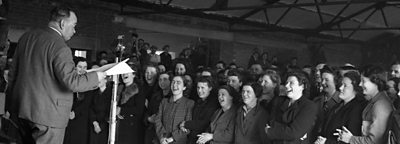Workers' Playtime broadcasting in May 1942 from an aircraft factory, for the 大象传媒 Home and Forces programmes.
Supporting the War Effort
With so many regular workers away fighting, everyone left behind had to do their bit. For many that meant unfamiliar work and little in the way of pay. The 大象传媒 supported this effort with special programmes designed to entertain and encourage the workforce.
Workers' Playtime was a lunchtime roadshow that went out three times a week from factory canteens and shop floors up and down the country. 大象传媒 engineers would erect a small wooden stage and sling microphones from the roof for a "studio" audience consisting of as many workers as could physically jam themselves into the venue.

And Music While You Work was another roadshow, specifically designed to relieve the monotony of production line working. Famous bands toured hundreds of factories, playing light rhythmical music at 10.30am and 3pm - the times of day when workers' concentration dipped. There were also 10.30pm shows for night shift workers.
But you didn't have to be in employment to do your bit. Everyone was encouraged to stretch their rations - for example by producing their own food. The 大象传媒 supported the Dig For Victory campaign with programmes such as Back to the Land and The Radio Allotment, while The Kitchen Front offered ingenious suggestions on how to make meagre supplies go further and taste better.
Other programmes offered practical help on issues such as how to save fuel. Children's Hour ran a Blue Peter-style salvage competition, the winners of which collected nine tons of scrap. The Radio Doctor advised listeners on how to stay healthy, and there were talks on the use and care of the gas mask, ways of implementing the blackout, and how to protect your home.
The radio diet included documentary programmes such as Home Front, In Britain Now, Go To It and We Speak for Ourselves, focusing on politics and social change, and providing vibrant sketches of how people were living, working and managing in adversity, while others told the story of the war at home. These included Spitfire Over Britain, Watchers Of The Sky, Coastal Command, Bombers over Britain, Swept Channels and Women Hitting Back.
Education
Never was the 大象传媒's educational role more important. Many thousands of children were evacuated to the country, putting enormous pressure on rural schools. And many more saw their schooling disrupted by bombing.
Adding to the challenge facing the broadcasters were paper shortages, which meant educational programmes could not be supplemented with educational pamphlets. As a result the 大象传媒 overhauled its approach to educational provision. Programmes had to be amusing and interesting to hold the audience, as well as provide reassurance. Pre-war series were modified and simplified, and dramatisation and narrative were developed to capture the imagination of listeners.

By the end of the war the 大象传媒 had bolstered its schools output to more than 30 weekly series plus a daily news commentary and twice-weekly religious services for children. The number of schools making use of the 大象传媒's educational output rose from 10,000 to 12,000 despite the fact that many schools had been forced to close.
And, as they do now, programmes of more general appeal also offered educational value. A request to the Forces Programme for something a little more informative led to The Brains Trust. The show, featuring a panel of experts answering such questions as "what makes us sneeze?", took off. With a weekly postbag of 4,000 letters, it was the first serious programme to attract a mass audience.
During the war the chimes of Big Ben were silenced from 16 June to 8 September 1944 due to a flying bomb attack. But listeners never knew the difference. The famous chimes had been pre-recorded for broadcast.
